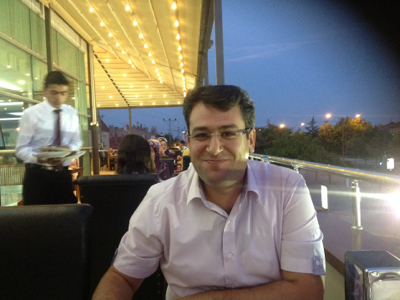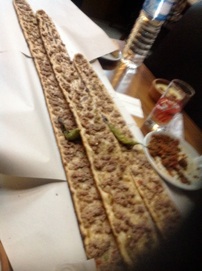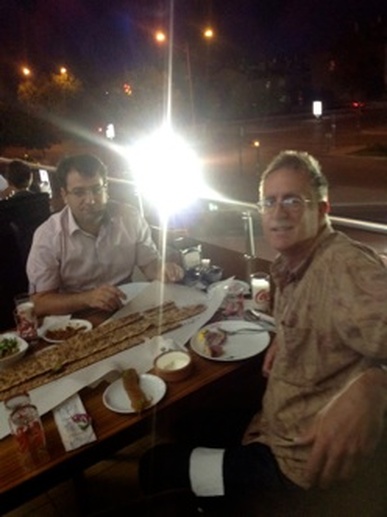Last night Salih invited me to dinner. He’d been telling me, ever since I arrived, that I should try Konya’s specialty dish “Etli Ekmek” which literally means bread with meat. I know it sounds funny, and it kind of is. I had no idea what it was but was looking forward to try it out.
He showed up to pick me up at the hotel around 7:30. Fast-breaking time last night was 8:12. The idea is to get to the restaurant so you can break your fast at the exact right moment. He was somewhat dressed up - so I was glad I wore my nice jeans rather than my usual shorts and sandals. I had expected (and hoped) that he’d bring his kids but it turned this was just for us.
Konya is a much larger city than I imagined. It’s very crowded and lots of scary traffic. We drove around for a while and arrived at the restaurant that specialized in Etli Ekmek. We were told that we should’ve made a reservation, and there was no room.
Back we got into the car with Salih’s typical “it’ll all be alright” attitude. He drove like a maniac for another half hour. By this time I’m used to his driving style but now we’re in the city, not in the open road. Instead if sheep and cows, we’re dodging humans. It turns out this restaurant has a branch on the other end of town. We got there very close to fast-breaking and thankfully there was one table left, and it was for us.
Now I don’t know quite how to explain the population of Konya. The women are almost always covered. By that, I don’t mean the severe looking dark hijab that only shows the eyes. These women practice a fashion of their own. The economy in Turkey is very strong now - the government is very supportive of everybody - free schooling, free health-care, everything you can imagine - and the people of Konya are, for the most part, middle class (by American standards) and wealthy. And ultra-conservative.
When we were driving to Çatal this morning there was an older woman walking down the street, completely covered (a long coat with long sleeves buttoned up to the neck and a scarf around her head) in the heat. And I said to Salih - why is this old woman covered when it’s so hot? It must be so uncomfortable. (it seems the reason for the heavy dress is to protect women from men’s attention. Here is a link that sort of explains the reasons for this. ) Salih said - and this the wildest rationalization I’ve ever heard - he said, it’s better for her. The clothes, he said, protects her from the heat. That’s why they cover up so much - they’re cooler that way. And I looked at him, and his short sleeves, and I said, then why aren’t you all covered up? Won’t it be good for you too? Let’s go buy you a coat and a scarf. He thought this was awfully funny but then changed the subject.
He showed up to pick me up at the hotel around 7:30. Fast-breaking time last night was 8:12. The idea is to get to the restaurant so you can break your fast at the exact right moment. He was somewhat dressed up - so I was glad I wore my nice jeans rather than my usual shorts and sandals. I had expected (and hoped) that he’d bring his kids but it turned this was just for us.
Konya is a much larger city than I imagined. It’s very crowded and lots of scary traffic. We drove around for a while and arrived at the restaurant that specialized in Etli Ekmek. We were told that we should’ve made a reservation, and there was no room.
Back we got into the car with Salih’s typical “it’ll all be alright” attitude. He drove like a maniac for another half hour. By this time I’m used to his driving style but now we’re in the city, not in the open road. Instead if sheep and cows, we’re dodging humans. It turns out this restaurant has a branch on the other end of town. We got there very close to fast-breaking and thankfully there was one table left, and it was for us.
Now I don’t know quite how to explain the population of Konya. The women are almost always covered. By that, I don’t mean the severe looking dark hijab that only shows the eyes. These women practice a fashion of their own. The economy in Turkey is very strong now - the government is very supportive of everybody - free schooling, free health-care, everything you can imagine - and the people of Konya are, for the most part, middle class (by American standards) and wealthy. And ultra-conservative.
When we were driving to Çatal this morning there was an older woman walking down the street, completely covered (a long coat with long sleeves buttoned up to the neck and a scarf around her head) in the heat. And I said to Salih - why is this old woman covered when it’s so hot? It must be so uncomfortable. (it seems the reason for the heavy dress is to protect women from men’s attention. Here is a link that sort of explains the reasons for this. ) Salih said - and this the wildest rationalization I’ve ever heard - he said, it’s better for her. The clothes, he said, protects her from the heat. That’s why they cover up so much - they’re cooler that way. And I looked at him, and his short sleeves, and I said, then why aren’t you all covered up? Won’t it be good for you too? Let’s go buy you a coat and a scarf. He thought this was awfully funny but then changed the subject.
| Finally our etli ekmek came and it was this: A very very very long pizza. As can be seen in the photo, we got three of them. They were carried on a very long tray by a lovely young covered woman. It’s the same thing as another Turkish dish, lahmacun, only long. Salih insists it’s not the same thing so I keep my thoughts to myself. |
This was a rather luxurious restaurant by Turkish standards. The people were all nicely dressed and very cosmopolitan. Not all women are covered. Next to us there was table with two young couples - if you saw them you’d think they were from New York. These differences in dress are the norm and go unnoticed. My mother worries that under the current administration the head scarf is becoming the social norm and that eventually women who don’t cover will be scorned. I wouldn’t be surprised.
Salih and I enjoy ourselves. He shows me how to eat etli ekmek. You break off about six inches and then roll it up. It’s very specific.
Here is the thing about my friendship with Salih: I know everything about him yet he knows very little about me. He thinks I’m a great guy - gentle polite and generous. He knows I’m not a true believer. Today he said we should never pre-judge people. He practices that brand of Islam that is all loving and kind and generous. But not entirely forgiving. He says that if a person doesn’t keep the fast and doesn’t have a very good reason, that person will be punished.
He’s very open with me. He says he had his days of crazy living. He took alcohol and ran around with women. He shared a few incidents. He’s pretty much an open book with me.
The other day he asked: Sinan Bey, why didn’t you ever get married? I didn’t think about it very long because I knew the question would come sooner or later. Again, as with my seat partner on the plane, I had to make a decision: lie or tell the truth. I decided to lie. Not only did I lie, I became quite elaborate. I said I’ve been with women here and there, and nobody seemed the right match. I said, I like being a bachelor because my work requires me to travel. I couldn’t sustain a family like you, I said, I could never hope to be as good a father as you. He seemed to accept this and we moved along.
What was surprising was how easy this was for me. I just fell into the lie naturally and without batting an eye. I was confident and sure of my story. It was a bit sad because it reminded me that this is how I lived for a big part of my life. That many gay men - and women - continue to live as though they are someone else. It’s safer, of course, to lie. I’m not - as my mother would put it - “waving a flag.” I’m just simply playing a role and not being myself. And it’s fine, it’s like riding a bike with a bad seat. When I had that experience with the woman on the plane it felt as though I’d upset her balance, like a turtle on its back. In this instance, I decided to protect Salih.
Salih and I enjoy ourselves. He shows me how to eat etli ekmek. You break off about six inches and then roll it up. It’s very specific.
Here is the thing about my friendship with Salih: I know everything about him yet he knows very little about me. He thinks I’m a great guy - gentle polite and generous. He knows I’m not a true believer. Today he said we should never pre-judge people. He practices that brand of Islam that is all loving and kind and generous. But not entirely forgiving. He says that if a person doesn’t keep the fast and doesn’t have a very good reason, that person will be punished.
He’s very open with me. He says he had his days of crazy living. He took alcohol and ran around with women. He shared a few incidents. He’s pretty much an open book with me.
The other day he asked: Sinan Bey, why didn’t you ever get married? I didn’t think about it very long because I knew the question would come sooner or later. Again, as with my seat partner on the plane, I had to make a decision: lie or tell the truth. I decided to lie. Not only did I lie, I became quite elaborate. I said I’ve been with women here and there, and nobody seemed the right match. I said, I like being a bachelor because my work requires me to travel. I couldn’t sustain a family like you, I said, I could never hope to be as good a father as you. He seemed to accept this and we moved along.
What was surprising was how easy this was for me. I just fell into the lie naturally and without batting an eye. I was confident and sure of my story. It was a bit sad because it reminded me that this is how I lived for a big part of my life. That many gay men - and women - continue to live as though they are someone else. It’s safer, of course, to lie. I’m not - as my mother would put it - “waving a flag.” I’m just simply playing a role and not being myself. And it’s fine, it’s like riding a bike with a bad seat. When I had that experience with the woman on the plane it felt as though I’d upset her balance, like a turtle on its back. In this instance, I decided to protect Salih.
Here's what I learned from Salih:
On the subject of the excavation of burials at Çatalhöyük and the skeletons that get carted in boxes:
In the muslim faith, when someone dies they do what's called a nefrit (?) They wash the body and rinse it in rose water or other nice smelling liquid. Then they wrap it in a very white sheet before they bury it. The idea is that the body leaves the earth cleansed and pure. If someone touches a bone of that body, the entire process must be repeated. Removing those skeletons is immoral because no one performs the nefrit on them.
On the subject of ramadan:
The benefits of fasting. Fasting rests the blood. It also rests the essential organs - the stomach the spleen and the liver. These things work too hard and a rest for them is beneficial.
The other benefit is if someone is wealthy, fasting makes them realize what it’s like to be poor. Even if they have the bread to eat, they will not eat it, no matter how hungry they get - like the poor.
Here is WHAT SALIH LEARNED FROM ME:
On our way back from Çatal to Konya, there is a very prominent stop sign. It says DUR. The first few times Salih would drive right through it which was rather shocking for me. And I kept saying, I can’t believe you drove right through that DUR sign. And he’d just chuckle and say there’s no traffic. Then, one day, suddenly he stopped. I was surprised and I said: what happened? He said I stopped the other day and I liked it. I enjoyed it so I’m stopping now.
The seat belt for Salih was an unnecessary accessory. He was a bit surprised when I strapped on as soon as I got in the car. He took notice. Then one day he started putting on his seat belt as well. I took notice. He smiled and said: I’m beoming an American. But only on the open road, not in the city.
In the typical Turkish manner, suddenly a red light appeared on the road. Who knows why? Salih is somewhat annoyed by this. He says it’s perfectly unnecessary. We don’t stop at the red light.
Early tomorrow morning Salih will drive me to the airport. I’m off to Istanbul for three days, and then back to Provincetown. I’m a bit sad about leaving Konya - and it will be an emotional parting with Salih.



 RSS Feed
RSS Feed